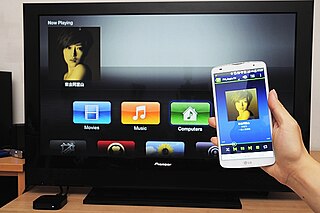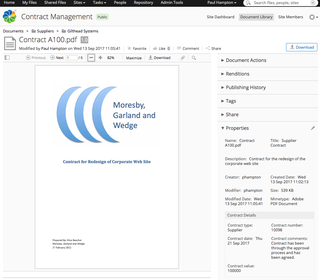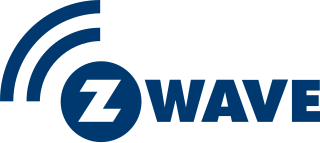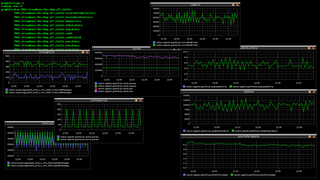Related Research Articles

Interoperability is a characteristic of a product or system to work with other products or systems. While the term was initially defined for information technology or systems engineering services to allow for information exchange, a broader definition takes into account social, political, and organizational factors that impact system-to-system performance.
The Organization for the Advancement of Structured Information Standards is a nonprofit consortium that works on the development, convergence, and adoption of projects - both open standards and open source - for computer security, blockchain, Internet of things (IoT), emergency management, cloud computing, legal data exchange, energy, content technologies, and other areas.
Health Level Seven, abbreviated to HL7, is a range of global standards for the transfer of clinical and administrative health data between applications with the aim to improve patient outcomes and health system performance. The HL7 standards focus on the application layer, which is "layer 7" in the Open Systems Interconnection model. The standards are produced by Health Level Seven International, an international standards organization, and are adopted by other standards issuing bodies such as American National Standards Institute and International Organization for Standardization. There are a range of primary standards that are commonly used across the industry, as well as secondary standards which are less frequently adopted.
freedesktop.org (fd.o), formerly X Desktop Group (XDG), is a project to work on interoperability and shared base technology for free-software desktop environments for the X Window System (X11) and Wayland on Linux and other Unix-like operating systems. Although freedesktop.org produces specifications for interoperability, it is not a formal standards body.
Free and Open source Software Developers' European Meeting (FOSDEM) is a non-commercial, volunteer-organized European event centered on free and open-source software development. It is aimed at developers and anyone interested in the free and open-source software movement. It aims to enable developers to meet and to promote the awareness and use of free and open-source software.

Alfresco Software is a collection of information management software products for Microsoft Windows and Unix-like operating systems developed by Alfresco Software Inc. using Java technology. The software, branded as a Digital Business Platform is principally a proprietary & a commercially licensed open source platform, supports open standards, and provides enterprise scale. There are also open source Community Editions available licensed under LGPLv3.

Z-Wave is a wireless communications protocol used primarily for residential and commercial building automation. It is a mesh network using low-energy radio waves to communicate from device to device, allowing for wireless control of smart home devices, such as smart lights, security systems, thermostats, sensors, smart door locks, and garage door openers. The Z-Wave brand and technology are owned by Silicon Labs. Over 300 companies involved in this technology are gathered within the Z-Wave Alliance.
FxCop is a free static code analysis tool from Microsoft that checks .NET managed code assemblies for conformance to Microsoft's .NET Framework Design Guidelines.
Agricultural Information Management Standards (AIMS) is a web site managed by the Food and Agriculture Organization of the United Nations (FAO) for accessing and discussing agricultural information management standards, tools and methodologies connecting information workers worldwide to build a global community of practice. Information management standards, tools and good practices can be found on AIMS:
In the field of Industrial Control Systems, the interfacing of various control components must provide means to coordinate the signals and commands sent between control modules. While tight coordination is desirable for discrete inputs and outputs, it is especially important in motion controls, where directing the movement of individual axes of motion must be precisely coordinated so that the motion of the entire system follows a desired path. Types of equipment requiring such coordination include metal cutting machine tools, metal forming equipment, assembly machinery, packaging machinery, robotics, printing machinery and material handling equipment. The Sercos interface is a globally standardized open digital interface for the communication between industrial controls, motion devices (drives) and input output devices (I/O). Sercos I and II are standardized in IEC 61491 and EN 61491. Sercos III is specified in standards IEC 61800-7; IEC 61784-1, -2, -3 and IEC 61158. Sercos is designed to provide hard real-time, high performance communications between industrial motion controls and digital servo drives.
Unified communications (UC) is a business and marketing concept describing the integration of enterprise communication services such as instant messaging (chat), presence information, voice, mobility features, audio, web & video conferencing, fixed-mobile convergence (FMC), desktop sharing, data sharing, call control and speech recognition with non-real-time communication services such as unified messaging. UC is not necessarily a single product, but a set of products that provides a consistent unified user interface and user experience across multiple devices and media types.
Ntfsprogs was a collection of free Unix utilities for managing the NTFS file system used by the Windows NT operating system on a hard disk partition. 'ntfsprogs' was the first stable method of writing to NTFS partitions in Linux.

A Unix-like operating system is one that behaves in a manner similar to a Unix system, although not necessarily conforming to or being certified to any version of the Single UNIX Specification. A Unix-like application is one that behaves like the corresponding Unix command or shell. Although there are general philosophies for Unix design, there is no technical standard defining the term, and opinions can differ about the degree to which a particular operating system or application is Unix-like. Some well-known examples of Unix-like operating systems include Linux, FreeBSD and OpenBSD. These systems are often used on servers as well as on personal computers and other devices. Many popular applications, such as the Apache web server and the Bash shell, are also designed to be used on Unix-like systems.
buildingSMART, formerly the International Alliance for Interoperability (IAI), is an international organisation which aims to improve the exchange of information between software applications used in the construction industry. It has developed Industry Foundation Classes (IFCs) as a neutral and open specification for Building Information Models (BIM) as well as Information Delivery Specification (IDS).

Graphite is a free open-source software (FOSS) tool that monitors and graphs numeric time-series data such as the performance of computer systems. Graphite was developed by Orbitz Worldwide, Inc and released as open-source software in 2008.

Joinup is a collaboration platform created by the European Commission. It is funded by the European Union via its Interoperability Solutions for Public Administrations Programme.
The Open Neural Network Exchange (ONNX) [] is an open-source artificial intelligence ecosystem of technology companies and research organizations that establish open standards for representing machine learning algorithms and software tools to promote innovation and collaboration in the AI sector. ONNX is available on GitHub.
Microsoft, a tech company historically known for its opposition to the open source software paradigm, turned to embrace the approach in the 2010s. From the 1970s through 2000s under CEOs Bill Gates and Steve Ballmer, Microsoft viewed the community creation and sharing of communal code, later to be known as free and open source software, as a threat to its business, and both executives spoke negatively against it. In the 2010s, as the industry turned towards cloud, embedded, and mobile computing—technologies powered by open source advances—CEO Satya Nadella led Microsoft towards open source adoption although Microsoft's traditional Windows business continued to grow throughout this period generating revenues of 26.8 billion in the third quarter of 2018, while Microsoft's Azure cloud revenues nearly doubled.
References
- ↑ Downey, Laura; O'Donnell, Shane; Melvin, Tom; Quigley, Muireann (24 October 2023). "A European regulatory pathway for Tidepool loop following clearance in the United States?". Diabetic Medicine. 41 (4): e15246. doi: 10.1111/dme.15246 . PMID 37873612.
- ↑ Best, Jo. "These open-source software developers want to give diabetics new tools to manage their condition". ZDNet.
- ↑ "Tidepool CEO talks Pre-Cert era, interoperability". MedTech Dive.